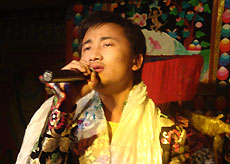Videos
A taste of Tibetan culture
By Chen Bei
Updated: 2008-06-05 17:38
An Interview with Wanma Sanzhi
|
|
 Tibetan singer and composer Wanma Sanzhi sings his Olympic-themed song in Norbulindka, a Tibetan restaurant in Beijing, May 23, 2008. [chinadaily.com.n] |
Name: Wanma Sanzhi
Age: 28
Hometown: Qinghai Province
Occupation: Stage Director of a Tibetan restaurant
What inspired you to compose the song "Olympics"?
It is passion, a passion for the Olympic sprit that drove me to compose this song. And, actually, to make an Olympic-themed song has been my dream for years.
I've heard many excellent Chinese musical works for the Games, but most are composed by artists from the Han people. So I wanted to make a piece showing the Chinese people's keenness from the point of the Tibetans.
China is a multi-nationality country, and the host should have pluralistic Olympic, with voices uttered by different peoples.
What makes the song special?
The song fuses different musical elements drawn from the Tibetan, the pop and the symphonic. The female vocal at the beginning is Tibetan. It takes the form of Yuanshengtai - raw and unpretentious.
The lyrics are penned in three languages: Tibetan, the mandarin and the English. It captures the Olympic spirit of tolerance and understanding.
What was the biggest challenge when you composed the song?
I wanted the song to blend pop, Tibetan and other Chinese folk elements.
At first, I tried to draw in some elements both from the Peking opera and the Tibetan music, attempting to put them in harmony. I finally gave up experimenting because I am not good at Peking opera.
Can you tell us more of your experiences in recording this song?
I received help from many of my friends, financially and spiritually. They thought it was worthwhile to do something for the Olympics.
The female vocals were done by an amateur, a waitress at a restaurant. Another friend joined me to make musical arrangements free of charge.
Production was done for less than 1000 yuan due to financial problems. I think it would be better if the instruments were not synthesized.







